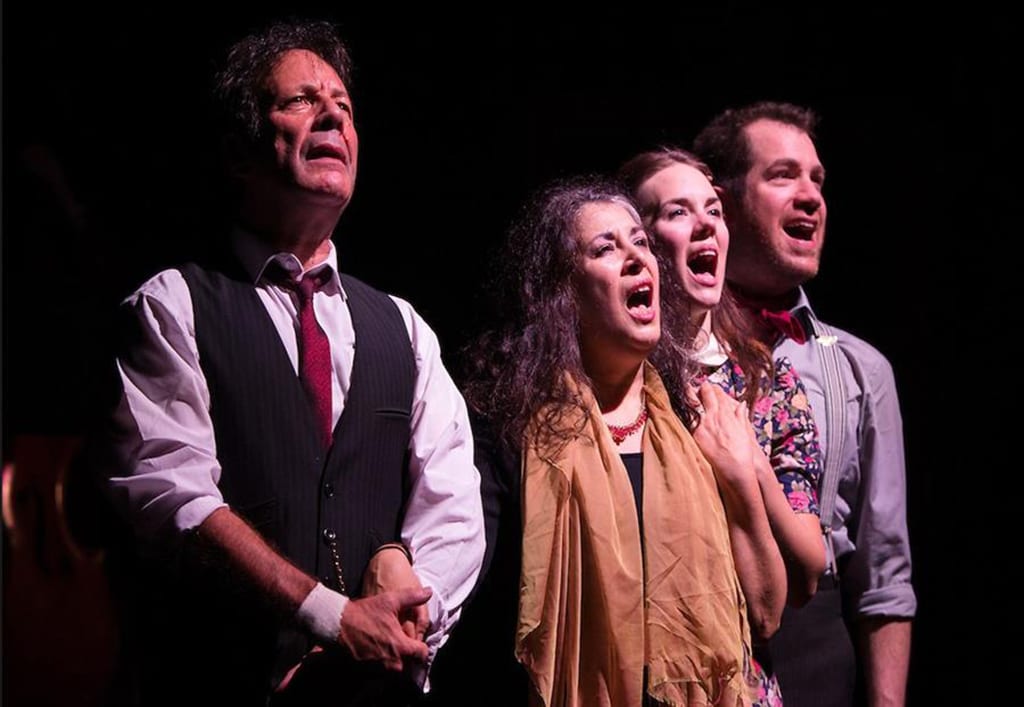French popular music from the middle of the Twentieth Century never really travelled, certainly in terms of artistes. OK, you might name Edith Piaf, and perhaps at a push Johnny Hallyday, but you’d be hard-pressed to name a third.
It’s a fair bet that the name you’d come up with though, if you could, would be Jacques Brel, mid-century singer and composer of songs as angst-ridden, philosophical and – most importantly – French as any other of his generation.
If you did, the problem would be…as the programme for Jacques Brel is Alive and Well, and Living in Paris, (the revue of his songs now enjoying a revival at The Charing Cross Theatre) points out, Jacques Brel, along with champagne and croissants, though claimed by the French as their own, didn’t come from France. Brel was born in Belgium.
No matter. What we have here is a compilation show, without a narrative, of 28 of what we must presume are his greatest hits, though I have to admit I only recognised two of the songs, and one of those was because it had been used on an Ovaltine advert.
The show was first staged in New York in January 1968, and ran for four years at New York’s Village Gate Theatre where its cast included Mort Shuman who, along with Eric Blau, the shows production supervisor, did the translations of the songs from the original French. Though to a twenty-first century ear they seem somewhat uneven in quality, we must assume that Mr Brel considered them adequate as he was happy for the show to go ahead. This production is based on the 2006 Off-Broadway version.
Bad casting can wreck a good show, but happily for all concerned, brilliant casting can add that extra special something to a less conventionally attractive one. That’s certainly the case here, with the four members of the cast each at the top of their game.
The show opens with Eve Polycarpou centre stage singing ‘Le Diable (Ca Va)’. No longer, I hope she’ll forgive me for pointing out, in the first bloom of youth, this is a woman who has lived and every memory, every experience, every requited love and every lost hope gloriously informs her performance.
Representing the more mature man in the cast is David Burt, who gets probably the funniest song, and certainly puts in the funniest performance, with ‘Funeral Tango’ in Act Two. Throughout, though, he too exhibits an exceptional range of emotions. As he helms the Act One closer, ‘Amsterdam’, it really is very difficult to see how his performance could be any more intense.
Raising the flag for the younger generation are Gina Beck and Daniel Boys who, though they still both possess a winning youthful exuberance, are growing in maturity and are here both given ample opportunity to explore their range.
Gina helms the bitterly poignant ‘Old Folks’ and the wonderfully tart and unexpected ‘Timid Frieda’ (that Ovaltine advert), while Daniel reaches depths I didn’t know he had during the Act One ‘Statue’, and treads an altogether more light-hearted path in both the Act Two opener, Madeleine, and in his excoriating duet with David Burt, again in the second half, ‘Middle Class’.
I said I recognised only two of the songs. You know the one, the other isn’t actually sung by a member of the cast, but by a member of the band, Dean Austin, the musical director who sings, in French, the 1961 song Le Moribund, which did become a bona fide hit in 1974 for Canadian singer Terry Jacks under the English title ‘Seasons in the Sun’.
The Charing Cross Theatre can be an unforgiving venue in which to stage shows, but production designer Chris de Wilde has made the wise move of having the band on stage, and tiered, thus filling the available space, as well as providing plenty of additional exits and entrances, and useful areas in which action can be staged.
Mike Robertson’s unobtrusive lighting, and Paul Gavin & James Nicholson’s sound design round off what is an expertly presented show. I wish it every success.

